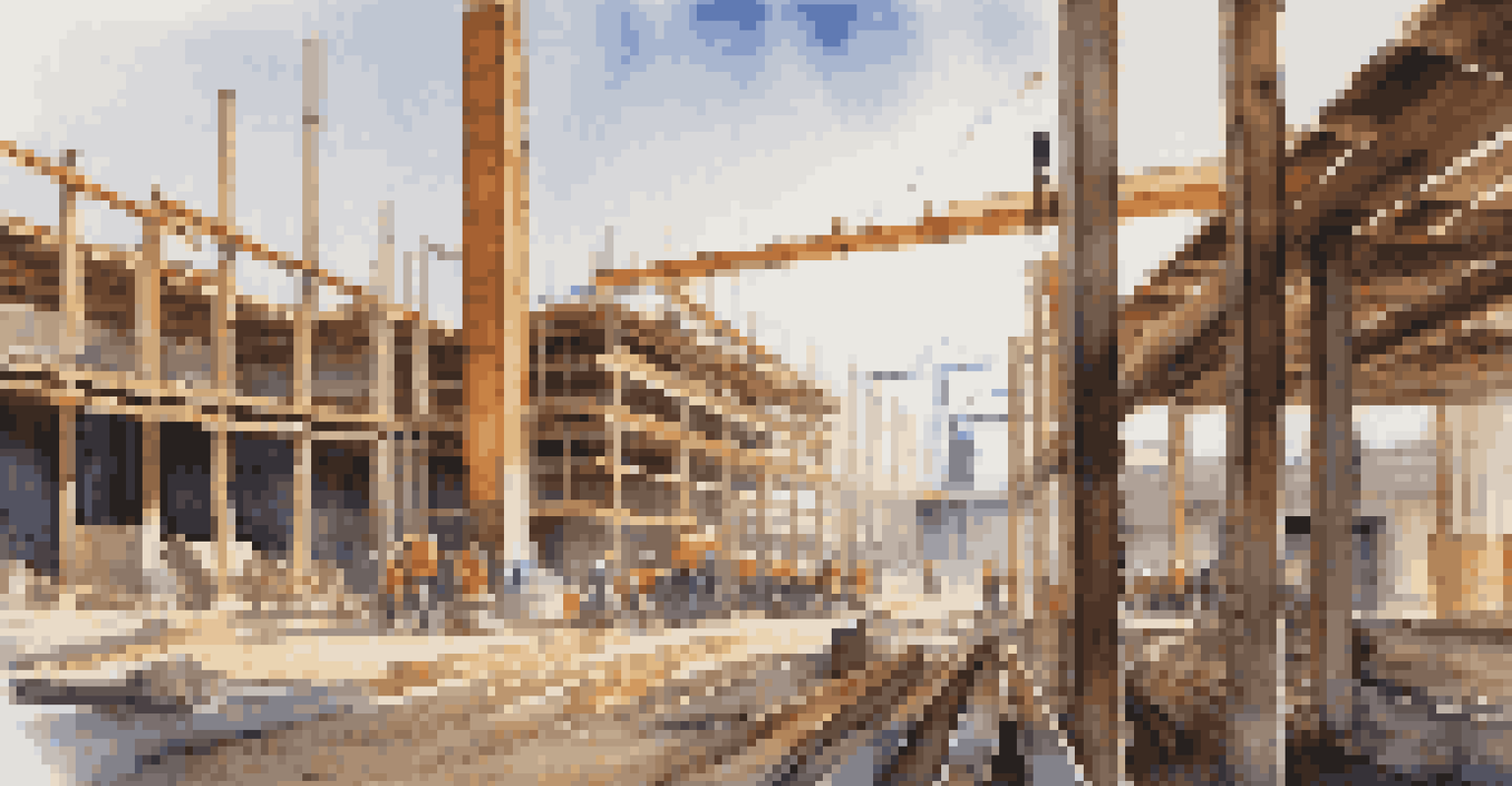Understanding How Trade Policies Shift Real Estate Values

What Are Trade Policies and Why Do They Matter?
Trade policies are regulations that a government implements to control international trade. They can define tariffs, import quotas, and trade agreements, which ultimately affect economic conditions. Understanding these policies is essential because they can influence various sectors, including real estate.
Trade is a game of risk. Policy changes can shift that risk from one side of the table to the other.
For instance, when a country lowers tariffs on imported materials, it can reduce construction costs, making housing more affordable. Conversely, restrictive trade policies may lead to increased costs, directly impacting real estate prices. Thus, trade policies play a pivotal role in shaping the economic landscape of real estate.
In short, trade policies are like the rules of a game, and when they change, the whole playing field can shift. This is particularly important for real estate investors and buyers who need to stay informed about such developments.
How Trade Agreements Affect Local Markets
Trade agreements can facilitate smoother economic interactions between countries, often leading to increased foreign investment. When a country signs a beneficial trade agreement, it can attract businesses, which in turn drives demand for commercial and residential properties. This influx can lead to rising property values in the local market.

For example, a new trade agreement that opens up markets can encourage multinational corporations to set up operations in a region. This creates jobs and boosts the local economy, which often results in higher housing demand. As more people move into the area, property prices typically rise as buyers compete for available homes.
Trade Policies Shape Real Estate
Understanding trade policies is crucial as they directly influence construction costs, housing affordability, and market dynamics.
Ultimately, trade agreements act like a catalyst for growth within local real estate markets. Recognizing the potential benefits of these agreements can help investors make informed decisions about where to buy.
The Impact of Tariffs on Construction Costs
Tariffs are taxes imposed on imported goods, and they can significantly influence construction costs. When tariffs are levied on materials like steel or lumber, builders often face higher expenses, which can trickle down to homebuyers. This can make housing less affordable and slow down new construction projects.
In a rapidly changing world, the only strategy that is guaranteed to fail is not taking risks.
For instance, if a country imposes high tariffs on imported steel, the cost for builders rises, leading them to either pass these costs onto consumers or cut back on construction. This can create a scarcity of homes, driving prices up further. Hence, understanding tariff implications is vital for anyone involved in real estate.
In essence, tariffs can create a domino effect in real estate markets. By understanding how these costs affect supply, buyers and investors can better navigate their options.
Foreign Investment and Its Real Estate Implications
Foreign investment plays a crucial role in shaping real estate markets, especially in urban areas. When trade policies encourage foreign investment, it can lead to a surge in property purchases. This increased demand can drive up prices, making it essential for domestic buyers to act quickly.
For example, cities that attract foreign investors often see significant price surges in residential properties. This can create competitive bidding situations, making it challenging for local buyers to find affordable options. Understanding these dynamics can be key for those looking to enter the market.
Foreign Investment Drives Prices Up
Increased foreign investment, spurred by favorable trade policies, can lead to significant price surges in local real estate markets.
In summary, foreign investment can significantly alter the real estate landscape. By keeping an eye on trade policies, potential buyers can better assess the risks and opportunities in their desired markets.
The Role of Economic Growth in Real Estate Values
Economic growth is often linked to trade policies, as favorable conditions can boost a country's GDP. When the economy flourishes, consumer confidence rises, leading to increased spending on housing. This surge in demand typically translates to higher real estate values.
For instance, a country experiencing rapid economic growth may see a boom in the job market. As more people seek housing, the demand for both rental and purchase properties increases, driving prices up. Thus, the interplay between trade policies and economic growth is crucial for understanding real estate trends.
In essence, a thriving economy can lift real estate values, but the foundation often lies in effective trade policies. Investors need to monitor economic indicators closely to make informed decisions.
Market Uncertainty and Real Estate Investments
Market uncertainty, often stemming from fluctuating trade policies, can create hesitation among investors. When regulations change unexpectedly, it can lead to unpredictability in property values, making it challenging to assess investment risks. This uncertainty can deter potential buyers or investors from committing.
For example, if a trade policy is suddenly reversed, businesses may scale back operations, leading to job losses. This can create a ripple effect in the real estate market, with property values potentially declining as demand decreases. Investors must be aware of these risks to navigate uncertain markets successfully.
Economic Growth Boosts Housing Demand
A thriving economy, often linked to effective trade policies, typically results in higher real estate values due to increased consumer confidence and spending.
Ultimately, understanding the relationship between trade policy changes and market uncertainty is crucial for making sound investment choices. Staying informed helps investors mitigate risks and seize opportunities.
Future Trade Policies and Long-Term Real Estate Trends
Looking ahead, potential shifts in trade policies can shape long-term real estate trends. As global economies evolve, so too will the regulations that govern trade. Keeping an eye on these changes can provide valuable insights into future real estate market dynamics.
For instance, emerging markets may present new opportunities for investment as trade barriers lower. Investors who anticipate these shifts can position themselves advantageously in the market. Thus, understanding future trade policies is crucial for long-term planning.

In conclusion, the interplay between trade policies and real estate values is complex, but it's essential for anyone involved in the market. By staying informed and adaptable, investors can navigate these changes effectively, ensuring their strategies remain relevant as the landscape evolves.